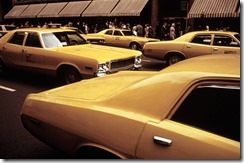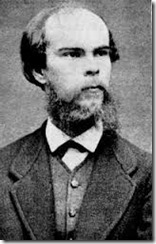
Bret Harris would be Verlaine’s urban interloper:
The noise from bars, the pavement's mire
Ruined sycamores leafing on black ire:
The bus, a typhoon of mud and metal,
Bouncing, between wheels, with its rattle,
Rolling its red and green eyes slowly,
Workers off to the club, pipes smoking,
Under the eyes of police, those drones,
Roofs dripping, sweating walls, damp stones,
Broken asphalt, gutters where sewers blend,
Behold, my road – with paradise at the end. (Verlaine, La Bonne Chanson XVI)
www.nndb.comHe would be Orwell’s plongeur:
“The Paris slums are a gathering-place for eccentric people - people who have fallen into solitary, half-mad grooves of life and given up trying to be normal or decent. Poverty frees them from ordinary standards of behavior, just as money frees people from work.” (Down and Out in Paris and London)
He would be Hugo’s lowlife traveler:
www.thebestschools.org
He who contemplates the depths of Paris is seized with vertigo.Nothing is more fantastic. Nothing is more tragic.Nothing is more sublime.
www.biography.com
By 3 am Park Avenue had gone to bed. No fares there; nor on Fifth or anything above 42nd Street; nor in the East Village. The dopers on Tompkins Square never left the park; alphabet-land far to the river was locked up. Shootings happened in the projects, not on the streets; but still no cabbie would ever venture there. The romance of the night ended on 8th Street, at 96th Street and 110th Street to the west. There was none in Harlem, the South Bronx, or Bedford Stuyvesant.
The nightshift was easy. There were fewer taxis on the street, traffic was light, tips were good, and money was quick. Bret picked up his cab at 4:30, worked the commuter crowd headed to Penn Station or Port Authority, then headed up Park Avenue for early diners, hustled the after-theatre crowd between Broadway and East Side restaurants, picked up stragglers who had missed late trains to New Jersey and Long Island, and then headed downtown where the real night shift began.
www.panynj.gov
He waited by Night Court for those who had made bail – prostitutes mostly, loiterers, and turnstile-jumpers; petty thieves and threatening husbands – and drove them home to Brooklyn, the Lower East Side projects, Christopher Street; but nothing more uptown than 4th Street. His rides knew the drill – show a $10 bill, get in, and fall asleep. The tips were surprisingly good. Everyone worked for a living. Whether one’s livelihood was legitimate or not, it made no difference. A nightshift solidarity.
www.nyc.theblog.blogspot.com
Which, when the romance had faded; when the smell of vomit, come, French fries, and piss overwhelmed any sense of adventure; and when passengers became abusive and hard, unremitting work was all that was left. At the end of his shift Bret’s back ached, his eyes watered, his legs were stiff, and his arms tight. He was in the business for a lark, as a fugue, and a romantic adventure. The money was incidental. He knew that sooner or later he would find a job that matched his pedigree, upbringing, and professional training.
There could be nothing, however, but sore muscles, headaches, and aggravation for those who drove 10 hours six days a week, 52 weeks of the year; made shit, and who died at the wheel. Bret was indeed an interloper – a Verlaine, Rimbaud, Baudelaire, or Mallarmé who observed, wrote, and left.
He worked for a living only one other time in his life. After his day job, he worked at Korvette’s, a low-end department store in Northern New Jersey. He sold men’s suits – cheap, poorly-tailored, sweatshop products. By 11 o’clock when the store closed, his hands were chapped and dry from handling rayon and polyester, his throat was sore from the bad air, and his eyes were bloodshot and squinty from the bad lighting.
Bret was at Korvette’s because, despite his beginner’s professional salary, he had gotten into debt; and the only way to pay it off was by working two jobs. Everyone else in Men’s or Haberdashery was in it for the long haul. This is how they made their living; how they had always made their living; and how they would always make their living. Bret would make enough to pay off his loan in three months and be done with Korvette’s, cheap suits, and bad air.
www.pinterest.com
Korvette’s and New York taxis quickly became an afterthought for Bret as he settled into his career. In Africa and Asia, as in most developing parts of the world, most people did nothing but work for a living – in the fields and in dismal textile factories; as sweepers, haulers, and beggars. Thousands of rickshaw-pullers worked the streets of Dhaka for a few taka per day, suffered disability and illness, and died young. Millions in rural India lived in poverty, farming marginal lands for a subsistence income.
Despite a concern for these workers and a portfolio of investment programs to improve their quality of life, Bret could never empathize with them. Their work was simply too archaic and medieval. It was little different from serfdom or slavery; and his work as a cabbie and a salesman of cheap suits had no relevance to the unremittingly hard and hopeless work of rural Mali. There was no working class in Chad; no underclass in Burkina; no underprivileged or marginally employed in Niger. Entire countries labored for little.
When he took a cab in New York, however, he was at home. Regardless of the service, whether attentive, pleasant, or indifferent, he remained a big tipper. In his mind, there was no way to compensate the drivers adequately. Hard work was in a special category – necessary, inevitable, often ignored, never noble, but worth recognition – no different from that overseas but more understandable; and having felt the same sciatica, troubled joints, urinary discomfort, and irritable colon as as taxi driver, he could identify and empathized with all of them.
Chekhov wrote about the dignity of labor in Three Sisters. Tuzenbach and Vershinin speak of the value of labor and how it will restore the Russian soul. Work, says Tuzenbach is an intrinsic value. It doesn’t matter whether society progresses (as Vershinin insists it will) or simply changes its outward appearance retaining the same fundamental human characteristics of greed, ambition, and self-interest. Work itself has value.

Chekhov was aware of the revolutionary changes in Russian society and had a pre-socialist respect for and appreciation of labor. Critics have agreed that the character Vershinin speaks for him when he says that society is progressing and that there will be a better, happier future; but only if men and women work for it. Vershinin is not as doctrinaire as Tuzenbach and sees work as a means to an end, not as an end in itself.
After months of the nightshift, hours in the garage waiting with his fellow drivers for the dayshift cars to come in, and wind-down beers on 8th Avenue, Bret knew that there was no dignity in labor nor tragedy, nor character, nor ultimate rewards. It’s what most of the world’s population do, reluctantly, unhappily, but necessarily; and if there is any nod in their direction, it is to acknowledge their silence. They are dray horses which are harnessed up, pull the plow; rest; and return to the same fields the next day.
Metro, Boulot, Dodo say the French – the predictable and invariable routine of the worker. He doesn’t notice the night people on the quays as he pulls the train into the Montparnasse-Bienvenue station. He pays no attention to the street people sleeping on the Rue Commandant Leandri as his truck sprays water into the gutters and rotary brushes sweep the street. He notices no one on the metro on the way home from the Michelin factory.
www.vdi.beautycella.fr
Bret liked his job – or at least the women, tropical beaches, five-star hotels, local cuisine, imams, intellectuals, and incidental travelers he met. Except for the nightshift and Korvette’s he had never worked for a living. His native facility with languages, silver tongue and charm, quick-study ethic, and discipline , made his professional enterprise engaging and rewarding. It was the kind of life he would have led even without getting paid. Real work – in the factory, on the street, in the fields, driving the bus, or cleaning the streets – was for other people. He had been brought up and educated since he was a child to avoid work, to steer clear of labor, and to focus on intellectual achievement, private enterprise, and wealth.
Yet every time he returned to the States and took a cab, he was reminded of his own taxi days. Regardless of service, he was a big tipper. Even if there was no dignity in labor, nor any intrinsic value in it; nor even any ends that justified the means, he still dropped a few coins in the basket. A small tribute. An acknowledgement of the compact between driver and passenger. A tip of the hat to a tiring job with no advancement, no great rewards, and no end.
He kept his NYC hack license framed on the wall of his study along with the photo of him and three Jivaro Indians drifting down the Napo River to the Amazon. Two adventures, poles apart, two accented journeys, both important and unforgettable.
“Who’s that?”, asked a friend referring to the Ecuadorian pirogue.
“That’s me”, said Bret. “I used to drive a cab.”




No comments:
Post a Comment
Note: Only a member of this blog may post a comment.